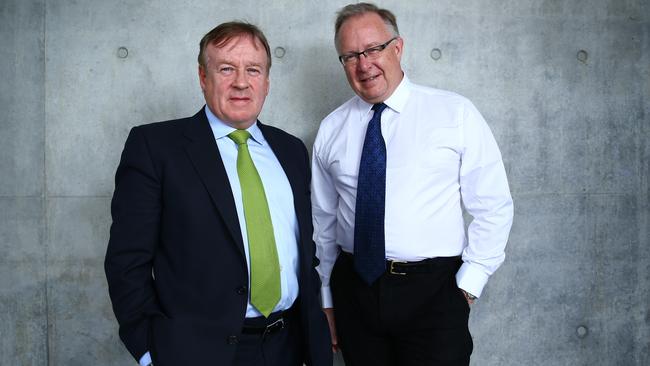Judo’s tenfold expansion plan

There’s no time like now for Joseph Healy and David Hornery’s capital-munching SME lender Judo Bank to put out its hand out for an extra $400m, putting the start-up close to unicorn status.
The liquidity pool is deep, and Judo has established a track record of meeting and beating (with apologies to Scott Morrison) its targets. With Judo established on the eastern seaboard and pumping out at least $50m in new lending a week, the co-founders have switched their thinking to the longer term.
The five-year plan, developed 18 months ago, budgets for a near-tenfold expansion in the loan book from $1.1bn to $10bn-$11bn.
Momentum is building, and the pipeline boasts well over $1bn in lending opportunities.
The major banks are mostly dismissive of Judo’s ambitions, saying its growth has mainly come from their workout areas where they try with varying degrees of success to nurse comatosed customers back to sound financial health.
Hornery’s response is: “Well, they would say that, wouldn’t they?”
The reason the two ex-National Australia Bank business bankers brought Judo to life was to bring back the lost art of relationship banking. They espouse the “four Cs” of SME banking — the character of management, the cashflow of the business, the capital in the business in all its forms, and the collateral available to secure a loan.
“For the majors, it’s mostly about collateral; they’re very thin on the relationship side,” Hornery says dismissively.
While a ten-fold increase in the loan book by 2023 looks daunting, the pathway is clear.
By mid-2020, internal numbers forecast $2bn in loans, rising to $4bn by the end of 2020.
Potential investors in Judo’s third-round raising will crunch their own numbers to see what’s possible and what’s founders’ fantasy, given the current credit cycle is one of the most benign in living memory. Judo readily concedes that attracting seed capital — and even its $140m first-round raising was heavy going, but it’s a much easier sell to convince existing shareholders to follow up in later rounds if you’ve met budget.
Others have so far stayed on the sidelines but could be ready to make a commitment after staying in touch with the Judo story. An initial public offering remains on the horizon, although a final decision rests with the owners.
Unfairly targeted
As bushfires continue to blacken the country, the nation’s biggest pension fund, AustralianSuper, believes it has been wrongly targeted in the global rage against climate denialism.
On the face of it, the activists appear to have a point — AustralianSuper exercised its powerful vote against all 16 climate change shareholder resolutions across 10 locally listed groups in 2019.
Financial services companies, including three of the four major banks, accounted for six of the 10. Confoundingly, the $185bn fund behaved differently with some of its offshore holdings. For example, it ignored the recommendation of the Amazon board and voted for a shareholder proposal that called on directors to immediately prepare a public report on how the company was preparing for climate change disruption.
The board believed it was already doing this, given its promise to disclose Amazon’s climate footprint, along with related goals and programs.
It all begs the question: what exactly is AustralianSuper’s position on climate change, and why did it vote against shareholder resolutions at ANZ Bank, National Australia Bank, Westpac, Suncorp, IAG, QBE, Rio Tinto, AGL, Origin and BHP?
Right there, that’s five of the nation’s top half-dozen companies by market value, and 10 of the top 30.
The fund’s position is actually crystal clear, and it’s applied consistently worldwide. It wants companies to cut their emissions in line with the Paris Agreement, manage their climate risks to safeguard long-term value, and update investors so they can make informed decisions.
The problem in Australia was that, apart from BHP, most of the shareholder resolutions sought disclosure on transition planning and emission reduction targets.
AustralianSuper told this column that, in all cases, the companies had already made the requested commitments, or had promised to do so in engagement sessions before the annual meeting.
In relation to the BHP resolution, which called on the company to suspend its membership of industry associations which have policy positions inconsistent with the Paris Agreement, the fund said it had engaged extensively with BHP, including the chairman Ken MacKenzie.
Ultimately AustralianSuper voted against the resolution because BHP was seeking to change the associations’ policies so they matched its own. AustralianSuper director ESG (environment, social and governance) Andrew Gray noted there had been a change in the Coal 21 constitution to focus the organisation’s role on clean coal research, and the Minerals Council had undertaken to develop a climate action plan in 2020.
While AustralianSuper voted against all 16 climate-related shareholder resolutions in Australia, it supported 60 per cent of global ESG shareholder resolutions, or 42 per cent of those related to climate.
The fund said it actively considered every climate resolution on which it voted, and would support those likely to be effective in “achieving their stated aims”.
Clearly, though, it’s not going to support across-the-board, standardised resolutions like those targeting the major banks in 2019 if they’ve already been implemented or will be shortly.


